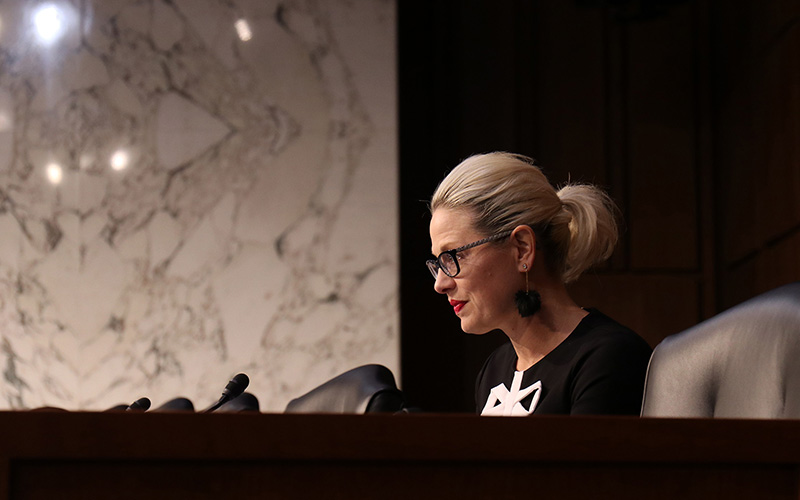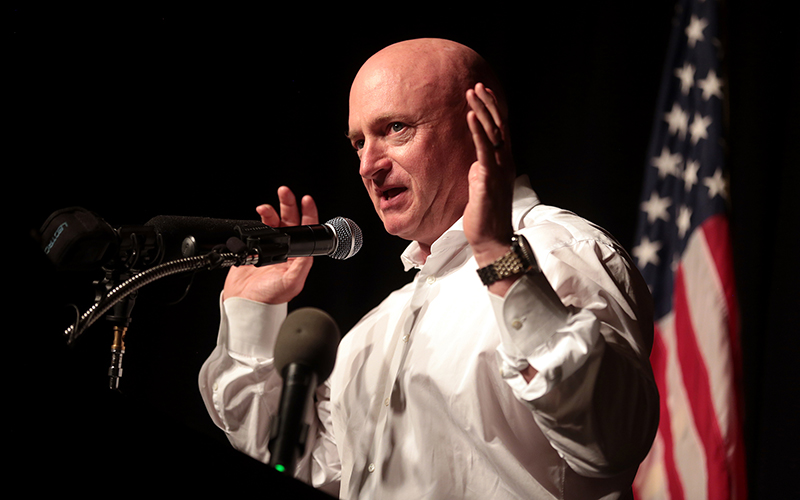
Sen. Kyrsten Sinema, D-Ariz., voted to impeach former President Donald Trump, who she said “betrayed his oath willfully, as no president has before.” While a majority of senators voted to convict, they did not get the 67 votes needed. (File photo by Keerthi Vedantam/Cronkite News)
WASHINGTON – Arizona’s senators joined all Democrats and a handful of Republicans Saturday in an unsuccessful attempt to convict former President Donald Trump in a historic second impeachment of the same president.
The 57-43 vote to convict Trump of incitement to insurrection in the deadly Jan. 6 storming of the Capitol by a pro-Trump mob fell short of the two-thirds vote needed in the 100-member Senate.
Arizona Sens. Kyrsten Sinema and Mark Kelly, both Democrats, kept relatively low profiles during the five-day impeachment trial, their only statements coming in one-word answers to a handful of votes during the trial, including Saturday’s final vote.
In statements after the vote, both Kelly and Sinema said they were convinced Trump was guilty of insurrection and had violated his oath to uphold the Constitution.
“Former President Donald Trump betrayed his oath willfully, as no president has before,” Sinema’s statement said. “He incited a violent insurrection against his own government because he did not like the outcome of a free and fair election.”
Kelly said there “has to be accountability for the attack on our democracy” to keep it from happening again. Both he and Sinema said they were swayed by the case House members presented.
“The evidence demonstrated that former President Donald Trump incited the violence at the Capitol on January 6th, 2021, with the intention of overturning the decision of the voters of Arizona and other states, and then did nothing to stop it because he hoped it would be successful,” Kelly said in his statement. “That makes him guilty of the charge laid out in the article of impeachment, and it also makes him guilty of violating his oath of office.”
It was the second impeachment trial for Trump – a first – and his second acquittal. But after the impeachment trial in 2020, when Trump faced charges of obstruction of Congress and abuse of power, the only Republican to vote to convict was Utah Sen. Mitt Romney, who only voted to convict on the abuse of power article.

Sen. Mark Kelly, D-Ariz., like Sinema, said he voted to convict Trump because the evidence showed that the former president “incited the violence at the Capitol” with the intention of overturning the election. (Photo by Gage Skidmore/Creative Commons)
Seven Republican crossed the aisle Saturday and joined all Democrats and two independents who voted to convict on the one article of insurrection. In addition to Romney, Republican Sens. Richard Burr of North Carolina, Bill Cassidy of Louisiana, Susan Collins of Maine, Lisa Murkowski of Alaska, Ben Sasse of Nebraska, Pat Toomey of Pennsylvania voted to convict. Every other Republican voted to acquit.
Republicans had argued that impeaching a former president was unconstitutional – a premise the Senate rejected in the first vote Tuesday, which allowed the trial to proceed.
For the next two days, House Democrats presented a detailed and often emotional review of the Jan. 6 insurrection, when mobs from a “Stop the Steal” rally that Trump addressed on the National Mall stormed the Capitol as Congress was certifying the election of President Joe Biden. Five people died in that attack, which disrupted the certification of the vote for several hours, and scores of police and protesters were injured.
House managers juxtaposed video clips of the attack with clips and tweets from Trump in which he encouraged the rioters and rebuffed appeals from lawmakers under siege to call off the crowds and deploy troops.
Trump’s lawyers argued that the impeachment was a continuation of the partisan “witch hunt” that led to Trump’s first impeachment, showing clips of Democrats calling for Trump’s impeachment from tbe earliest days of his presidency. While he could not be removed from office, a conviction would have prevented Trump from being elected president again.
They also argued that the incitement charge was an infringement of Trump’s free speech rights, playing a string of clips in which Democrats praised Black Lives Matters protesters and called on them to fight.
The defense rested after only a few hours Friday and the Senate met for final arguments and a vote Saturday – which was stalled briefly by a motion to bring witnesses. That was resolved when both sides agreed to admit a statement from Rep. Jaime Herrera Beutler, R-Wash., about a phone call during the height of the insurrection in which Trump rejected calls for help from House leaders.
Both Kelly and Sinema said they felt a duty to convict.
“It was our duty to conduct this trial and make it clear that an attack on our democracy cannot stand,” Kelly said. “Now, it is our duty to continue the work of addressing the significant challenges we face by beating this virus and rebuilding our economy.”